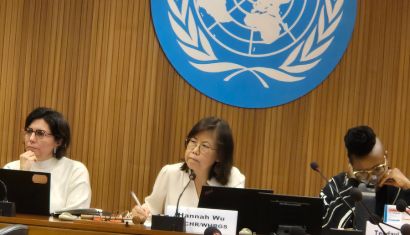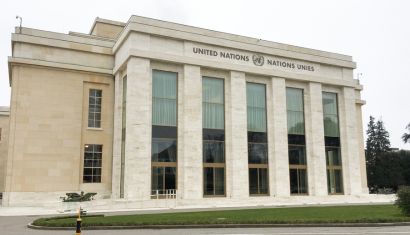
Right to education and privatisation
Right to education and privatisation
The GI-ESCR is currently leading three projects on privatisation in education:
-
A research and advocacy project on the impact of the development of private education in Morocco
-
International advocacy on privatisation in education using the human rights framework
The right to education guarantees that everyone should enjoy a quality education, free from discrimination and exclusion. This right, as UNESCO has recognized, is “… a powerful tool by which economically and socially marginalized adults and children can lift themselves out of poverty and participate fully as citizens.”[1] While important progress has been made in ensuring that the right to education is enjoyed by all, today millions of children remain deprived of educational opportunities, and globally the UN estimates that 123 million young people between the ages of 15-24 do not have basic reading and writing skills (61 percent of whom are young women).
Amidst this backdrop of continuing inequality, the global landscape when it comes to education is also rapidly changing. One of the most notable of these changes is the recent trend towards privatization in education in many countries. The detrimental impacts related to private investment in provision of health care, water and sanitation infrastructure, and land, including ‘land-grabbing’, have increasingly been documented in recent years. Privatization of education appears to be the new horizon that profit making investors are rushing into.
This trend is proving to have significant implications for the enjoyment of the human right to education, both in terms of quality and accessibility to education. As the UN Special Rapporteur on the Right to Education highlighted in a recent report about the Millennium Development Goals Post-2015 Framework: “in many parts of the world inequalities in opportunities for education will be exacerbated by the growth of unregulated private providers of education, with wealth or economic status becoming the most important criterion to access a quality education.”[2]
In particular, concern has been raised that privatization in education can lead to greater discrimination and that “[m]arginalised groups fail to enjoy the bulk of the positive impacts and also bear the disproportionate burden of the negative impacts of privatisation [in education].”[3] Wealth inequalities, between those who can afford to pay for private education providers and those who cannot, but also spatial inequalities, are just reinforced by privatization, further pushing into poverty already vulnerable groups.
Besides, privatization implies that States are no longer themselves providing education to the general public, and instead allow this role to be filled by non-State entities and institutions. However, under the international human rights framework, States are the duty-bearer when it comes to respecting, protecting and fulfilling the right to education, and they must ensure that there is no retrogression when it comes to the advancement and enjoyment of this right. Besides, privatisation questions and weakens the role of the State in one of the most essential social services, affecting issues from democratic participation to accountability and also impacting many other human rights.
Further discussion and dialogue are needed within international human rights circles to shed light on these issues, and to highlight people’s experiences where privatization in education is taking place. To help advance the discussion, the Global Initiative for Economic, Social and Cultural Rights and its partners, with the support of the Privatization in Education Research Initiative have engaged in national and international advocacy on the topic.
Related news
-
15/07/2014: Privatisation in Education: Advocacy and Research Workshop and Public Events Reports
-
07/07/2014: Report Highlights how Privatization of Education Negatively Impacts Girls in Many Parts of the World
-
27/05/2014: Consultation on the impact of the privatisation in/of education on girls' right to education
-
04/02/2014: The UN questions private education in Morocco
-
31//01/2014: Privatization of education in Morocco breaches human rights: new report
For more information, please see the following documents
-
The last report of the UN Special Rapporteur on the Right to Education highlighting the impact of private education on the right to education is available here: http://ap.ohchr.org/documents/dpage_e.aspx?si=A/68/294
-
The report submitted by the GI-ESCR and partners to the United Nations Committee on the Rights of the Child on privatisation is available here: http://globalinitiative-escr.org/?p=1139 and the recommendations can be found here: http://globalinitiative-escr.org/?p=1140. The GI-ESCR also preapred a reaction to the response of the Moroccan government to the list of issues raised by the CRC, which is here http://globalinitiative-escr.org/?p=1414
-
A visual summary of key issues in the reports is available here: http://globalinitiative-escr.org/?p=1329
-
The list of issues on Morocco raised by the UN Committee on the Rights of the Child after the GI-ESCR's advocacy is available here: http://goo.gl/4P5Lch (French).
See also
-
The website of the Privatisation in Education Research Initiative contains a lot of resources on the topic: www.periglobal.org/
-
The website of the Right to Education Project sums up the documents on privatisation in education and the right to education: www.right-to-education.org/issue-page/privatisation-education
-
The Global Campaign on Education has launched a webpage on privatisation in education: www.campaignforeducation.org/en/campaigns/privatisation
-
The website of Education International, which represents organisations of teachers and other education employees across the globe, and is engaged on privatisation http://www.ei-ie.org/
[1] See: http://www.unesco.org/new/en/education/themes/leading-the-international-agenda/right-to-education/
[2] UN Doc. A/68/294, para. 26.
[3] The Right to Education Project (RTE), ‘Privatisation in Education: Global Trends and Human Rights Impact,’ 2014.




